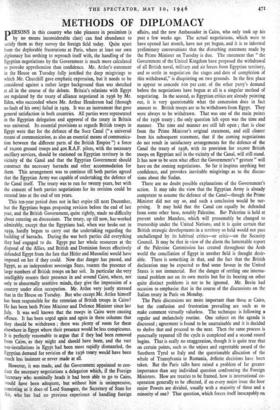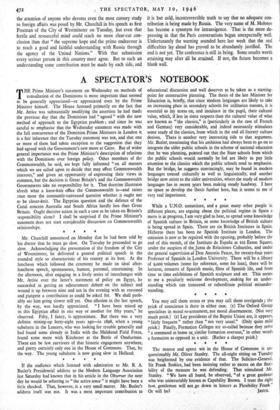METHODS OF DIPLOMACY
PERSONS in this country who take pleasure in pessimism (a by no means inconsiderable class) can find abundance to satisfy them as they survey the foreign field today. Quite apart from the deplorable frustrations at Paris, where at least our own diplomacy has nothing to reproach itself with, the handling of the Egyptian negotiations by the Government is much more calculated to provoke apprehension than confidence. Mr. Attlee's statement in the House on Tuesday fully justified the deep misgivings to which Mr. Churchill gave emphatic expression, but it needs to be considered against a rather larger background than was sketched at all in the course of the debate. Britain's relations with Egypt are regulated by the treaty of alliance negotiated in 1936 by Mr. Eden, who succeeded where Mr. Arthur Henderson had (through no fault of his own) failed in 1929. It was an instrument that gave general satisfaction in both countries. All parties were represented in the Egyptian delegation and approval of the treaty in Britain was universal. Its essential provisions as regards British troops in Egypt were that for the defence of the Suez Canal (" a universal means of communication, as also an essential means of communica- tion between the different parts. of the British Empire ") a force of to,000 ground troops and 40o R.A.F. pilots, with the necessary ancillary services, should be stationed on Egyptian territory in the vicinity of the Canal and that the Egyptian Government should construct the necessary barracks and other accommodation for them. This arrangement was to continue till both parties agreed that the Egyptian Army was capable of undertaking the defence of the Canal itself. The treaty was to run for twenty years, but with the consent of both parties negotiations for its revision could be entered into at the end of ten years.
This ten-year period does not in fact expire till next December, but the Egyptians began. proposing revision before the end of last year, and the British Government, quite rightly, made no difficulty about entering on discussions. The treaty, up till now, has-worked admirably, except that the Egyptians had, when war broke out in 1939, hardly begun to carry out the undertaking regarding the building of barracks. During the war both parties did everything they had engaged to do. Egypt put her whole resources at the disposal of the Allies, and British and Dominion forces effectively defended Egypt from the fate that Hitler and Mussolini would have imposed on her if they could. Now that danger has passed, and Egypt, as an independent sovereign State, resents the presence of large numbers of British troops on her soil. In particular she very intelligibly resents their presence in and around Cairo, where, not only to abnormally sensitive minds, they give the impression of a country under alien occupation. Mr. Attlee very justly stressed that in the House on Tuesday. But who except Mr. Attlee himself has been responsible for the retention of British troops in Cairo? He has been both Prime Minister and Defence Minister since last July. It was well known that the troops in Cairo were causing offence. It has been urged again and again in these columns that they should be withdrawn ; there was plenty of room for them elsewhere in Egypt where their presence would be less conspicuous. It is perfectly reasonable to argue that if they had been removed from Cairo, as they might and should have been, and the vast war-installations in Egypt had been more rapidly dismantled, the Egyptian demand for revision of the 1936 treaty would have been much less insistent or never made at all.
However, it was made, and the Government appointed to con- duct the necessary negotiations a. delegation which, if the Foreign Secretary who nominally heads it had been able to go to Cairo, vould have been adequate, but without him is unimpressive, consisting as it does. of Lord Stansgate, the Secretary of State for Air, who has had no previous experience of handling foreign affairs, and the new Ambassador in Cairo, who only took up his post a few weeks ago. The actual negotiations, which were to have opened last month, have not yet begun, and it is to informal preliminary conversations that the disturbing statement made by the Prime Minister on. Tuesday is due. The statement that " the Government of the United Kingdom have proposed the withdrawal of all British naval, military and air forces from Egyptian territory, and to settle in negotiation the stages and date of completion of this withdrawal," is disquieting on two grounds. In the first place to appear to concede too per cent. of the other party's demand before the negotiations have begun at all is a singular method of negotiating. In the second, as Egyptian critics are already pointing out, it is very questionable what the concession does in fact amount to. British troops are to be withdrawn from Egypt. They were always to be withdrawn. That was one of the main points of the 1936 treaty ; the only question left open was the time and manner. The time and manner are still left open ; that is clear from the Prime Minister's original statement, and still clearer from his subsequent statement, that if the coming negotiations do not result in satisfactory arrangements for the defence of the Canal the treaty of 1936, with its provision for to,000 British troops on Egyptian soil in the vicinity of the Canal, will still stand. It has now to be seen what effect the Government's " gesture " will have on the coming negotiations. So far it inspires anything but confidence, and provokes inevitable misgivings as to the discus- sions about the Sudan.
There are no doubt possible explanations of the Government's action. It may take the view that the Egyptian Army is already competent to assume the defence of the Canal—though the Prime Minister did not say so, and such a conclusion would be sur- prising. It may hold that the Canal can equally be defended from some other base, notably Palestine. But Palestine is held at present under Mandate, which will presumably be changed to trusteeship under the United Nations, and it is quite certain that British strategic developments in a territory so held would not pass unchallenged by its habitual critics—or critic—on the Security Council. It may be that in view of the alarm the lamentable report of the Palestine Commission has created throughout the Arab world the conciliation of Egypt in another field is thought desir- able. There is something in that, and the fact that the British declaration may be expected to find some favour in the United States is not immaterial. But the danger of settling one interna- tional problem not on its own merits but for its bearing on other quite distinct problems is not to be ignored. Mr. Bevin had occasion to emphasise that in the course of the discussions on the Italian treaty in Paris on Monday.
The Paris discussions are more important than those at Cairo, but the confusion and frustration prevailing are such as to make comment virtually valueless. The technique is following a regular and melancholy routine. One subject on the agenda is discussed ; agreement is found to be unattainable and it is decided to shelve that and proceed to the next. Then the same process is punctually repeated till the cycle is completed and a second round begins. That is really no exaggeration, though it is quite true that on certain points, such as the unjust and regrettable award of the Southern Tyrol to Italy and the questionable allocation of the whole of Transylvania to Rumania, definite decisions have been taken. But the Paris talks have raised a problem of far greater importance than any individual question confronting the Foreign Ministers. How are treaties to be framed, how is international co- operation generally to be effected, if on every major issue the four major Powers are divided, usually with a majority of three and a minority of one? That question, which forces itself inescapably on the attention of anyone who devotes even the most cursory study to foreign affairs was posed by Mr. Churchill in his speech as first Freeman of the City of Westminster on Tuesday, but even that fertile and resourceful mind could reach no more clear-cut con- clusion than that " the supreme hope and the prime endeavour is to reach a good and faithful understanding with Russia through the agency of the United Nations." With that submission every serious person in this country must agree. But to such an understanding some contribution must be made by each side, and it is but cold, incontrovertible truth to say that no adequate con- tribution is being made by Russia. The very name of M. Molotov has become a synonym for intransigence. That is the more de- pressing in that the Paris conversations began unexpectedly well. Unfortunately the warning sounded here last week that the real difficulties lay ahead has proved to be abundantly justified. The end is not yet. The conference is still in being. Some results worth attaining may after all be attained. If not, the future becomes a blank wall.



























 Previous page
Previous page